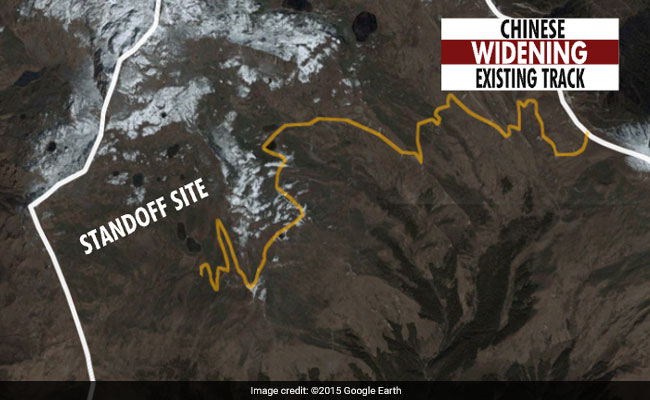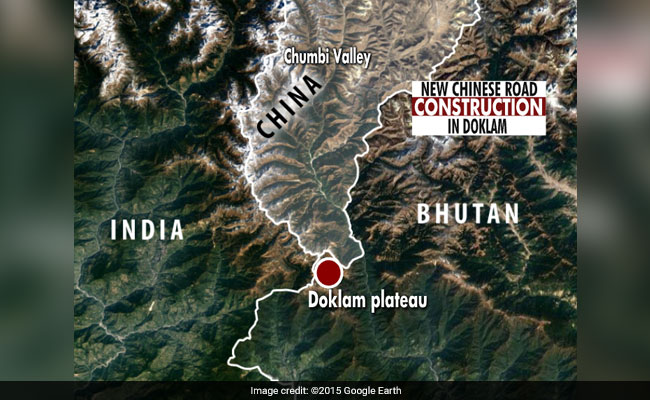SOURCE:
https://www.ndtv.com/india-news/just-10-km-from-last-doklam-stand-off-china-works-on-a-road-again-1759103
[ https://www.youtube.com/watch?v=2e8HzoKA0ds ]
[ https://www.youtube.com/watch?v=V54OnSWg-1k ]
October 05, 2017 23:21 IST
[ https://www.youtube.com/watch?v=-PfzsJWDfuw ]

Thwarted in its last attempt, China has now shifted its
Army officers NDTV has spoken to believe that the new

https://www.ndtv.com/india-news/just-10-km-from-last-doklam-stand-off-china-works-on-a-road-again-1759103
[ https://www.youtube.com/watch?v=2e8HzoKA0ds ]
[ https://www.youtube.com/watch?v=V54OnSWg-1k ]
With 500 Soldiers On Guard, China Expands Road In Doklam
BY
Aby Vishnu Som
HIGHLIGHTS
- China starts expandig road in disputed Doklam Plateau
- 500 soldiers accompanying construction workers
- New construction in same area that India holds highly sensitive
Thwarted in its last attempt, China has now shifted its
unused road construction material North and East of
the Doklam face-off site.
October 05, 2017 23:21 IST
Barely a month after the winding down of an aggressive
stand-off with India at the Sikkim border, the Chinese
Army is back to building a road on the Doklam Plateau,
just 10 km from the location of the last conflict. The
Doklam Plateau is claimed by both Beijing and Bhutan
as their territory. India backs Bhutan's claim.

China starts expanding road in disputed Doklam
Plateau
In mid-June, Indian soldiers crossed the Sikkim border
to stop the construction of a Chinese road near the
"Chicken's Neck", a thin strip that links India to its
northeastern states. After nearly 70 days of soldiers from
both sides staring down at each other just 150 metres
apart, the conflict, described as the worst in decades,
subsided with both countries accepting that they were
withdrawing their troops, though details were sketchy.
China pulled back its bulldozers and other road-making
equipment, said officials in Delhi at the time. Chinese
officers said the weather would be among the factors
that would determine its plans for construction.
Now, barely 10 kilometres from the location of the stand-
off, China is expanding an existing track, reinforcing its
claim to the disputed and remote Doklam Plateau. India
backs Bhutan's claim to the region and has made it clear
that it will not tolerate any infrastructure that would
allow China access to the Chicken's Neck, located just
south of Doklam.
Thwarted in its last attempt, China has now shifted its
unused road construction material North and East of the
face-off site. Road construction workers brought into
the area are accompanied by upto 500 soldiers though
there are no indicators that these soldiers will be
permanently based in the area - the Chinese town of
Yatung, which is less than 20 km away as the crow flies,
is a few hours by road and accommodates them. Neither
are there signs of permanent structures to
accommodate Chinese soldiers in the area which is
snow-bound and bitterly cold in the winter.
Army officers NDTV has spoken to believe that the new
road construction is meant to be a strong signal of
Beijing's intent to prove its territorial claims. A month
ago, Army Chief Bipin Rawat had warned, "As far as the
Northern adversary is concerned, flexing of muscles
has started. Salami slicing, taking over territory in a very
gradual manner, testing our limits or threshold is
something we have to be wary about. Remain prepared
for situations that are emerging gradually into conflict."

Construction in the same area that India holds highly
sensitive
It is likely that the Army Chief was referring to these
renewed Chinese efforts despite the de-escalation of the
Doklam crisis which paved the way for the Prime
Minister to travel to Xiamen for the BRICS summit last
month.
Sources have told NDTV that fresh Chinese road
construction activity in the area began shortly after
India and China chose to deescalate tensions on August
28. On August 18, the Indian Army, which dominates the
area, moved into the Doklam Plateau from their base at
the nearby Doka La (pass) and physically prevented the
Chinese from stretching the track. China's goal had
been to extend the track south across the Torso Nallah
to the Jhamperi Ridge, a dominant feature in the area
where the Bhutanese Army has a base.





